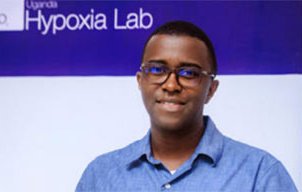For decades, the pulse oximeter the small clip-on device that measures oxygen levels in the blood has been a trusted staple in hospitals worldwide. From surgery rooms to neonatal wards, it has guided countless lifesaving decisions. But new research shows this seemingly universal tool may not serve all patients equally.
A groundbreaking 2020 study published in The New England Journal of Medicine revealed that pulse oximeters are three times more likely to miss dangerously low oxygen levels in Black patients than in White patients. The discrepancy stems from how light interacts with darker skin tones a flaw that exposes long-standing inequities in how medical technologies are designed, tested, and approved.
Now, Uganda is stepping in to help correct that imbalance. The Uganda Hypoxia Lab, the first independent medical device testing facility of its kind in East Africa and the only one in a low- or middle-income country is leading the charge to make pulse oximetry more accurate and inclusive.
In partnership with the University of California, San Francisco (UCSF) and the Association of Anaesthesiologists of Uganda (AAU), the lab evaluates how pulse oximeters perform on darker skin tones in real-world, low-resource settings.
Dr. Emmanuel Apore, an anaesthesiologist at the lab, explains that most pulse oximeters have traditionally been tested on lighter-skinned populations in high-income countries a practice that can have fatal consequences.
“Many of these devices overestimate oxygen levels in people with darker skin,” Dr. Apore notes. “That means a patient may appear stable when they’re actually hypoxic. In critical care, such delays in response can cost lives.”
The lab’s work builds on the Open Oximetry Project, a UCSF-led global initiative launched in 2022 to promote equity and accuracy in pulse oximetry worldwide.
For Dr. Apore, the mission is as much about representation as it is about science.
“For too long, global regulatory standards have been based on data from high-income countries,” he says. “The Uganda Hypoxia Lab gives Africa a voice in defining what ‘accurate’ means for everyone.”
The lab’s flagship study, Accurate Pulse Oximetry with Profound Hypoxia, will test 50 different oximeter models on over 400 volunteers. The findings will help manufacturers and regulators recalibrate devices to ensure they reflect the physiological realities of diverse populations.
The importance of this research became painfully clear during the COVID-19 pandemic, when pulse oximeters became vital diagnostic and monitoring tools. In many African settings, inaccurate readings in darker-skinned patients likely contributed to the under-diagnosis of severe hypoxia, delaying life-saving interventions.
“COVID-19 exposed how dependent we’ve become on technology that wasn’t designed with everyone in mind,” says Dr. Apore. “In Uganda, some patients appeared fine based on their readings until it was too late.”
The Hypoxia Lab’s establishment marks a pivotal moment in global health equity. For the first time, data from a low-income country could influence international medical device regulations not merely comply with them.
“Africa’s contribution to medical device research has been undervalued for too long,” Dr. Apore adds. “This lab allows Uganda to produce its own data and shape global safety standards. It’s a milestone for both science and justice.”
Looking ahead, the lab aims to become a regional training and innovation hub, mentoring Ugandan and East African researchers in device testing and regulatory science. Collaborations with Makerere University and Busitema University will further build local capacity for evidence-based medical innovation.
As the Uganda Hypoxia Lab advances its work, it is setting a powerful example of what equitable global health research should look like collaborative, inclusive, and data-driven.
“Patient safety should never depend on skin colour,” Dr. Apore concludes. “Our mission is simple to make sure the technology that saves lives can see everyone clearly.”
